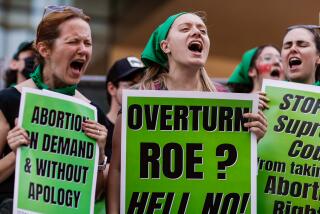Justices’ Nominations Topic of Candid Talks : Court: Ex-attorneys general lament focus on politics and abortion.
- Share via
SAN FRANCISCO — Two Republican former attorneys general denied Saturday that the Bush and Reagan administrations used an ideological “litmus test” to select Supreme Court justices--and one assailed Democratic presidential nominee Bill Clinton for pledging to appoint only jurists who support abortion rights.
The remarks by the two former high officials--Dick Thornburgh and Edwin Meese III--came during a rare and free-wheeling panel meeting of attorneys general from the last six presidential administrations.
The former top legal officers convened at Hastings College of the Law in a two-hour program videotaped for telecast on C-SPAN and Court TV. In lively exchanges, the current high court nomination process came in for criticism as too politicized and too focused on the abortion issue. And a rapt audience of law students, faculty and alumni got an unusual look behind the scenes of past court nominations.
Meese, responding to questions from the moderator, Harvard law professor Arthur R. Miller, cited last June’s high court decision upholding the right to abortion as evidence that nominees by Republican administrations had not been screened for their views on the issue.
In a 5-4 decision, Justices Sandra Day O’Connor and Anthony M. Kennedy--both nominated by former President Ronald Reagan--and Justice David H. Souter, a Bush appointee, unexpectedly provided key votes preserving Roe vs. Wade, the 1973 landmark abortion ruling.
“We were surprised (by the votes of the three) and that shows there was no litmus test,” said Meese, who served from 1985 to 1988 under Reagan.
Thornburgh, Bush’s attorney general from 1988 to 1991, did not mention Clinton by name but said he found it “highly offensive” that a presidential candidate would vow to ask potential court nominees how they would decide a particular case. Clinton has promised that in selecting nominees he would protect “the right to choose.”
Nicholas Katzenbach, attorney general under President Lyndon B. Johnson, a Democrat, responded that he would “bet my wallet” that other candidates besides Clinton had done the same thing.
Bush’s nomination of Justice Clarence Thomas drew fire from Elliot Richardson, a Republican who served in the Nixon Administration. Thomas, said Richardson, must have been “plucked from a very long list” of potential nominees. Bush’s description of the relatively inexperienced Thomas as the “most qualified” for the job was unsupportable, Richardson said. “The transparency of it became all too obvious,” he said.
Recalling past nominations, Katzenbach told how as a Justice Department official he had been told by then-Deputy Atty. Gen. Byron R. White to prepare a list of prospective nominees for President John F. Kennedy. Katzenbach dutifully came up with 15 names, all of which the President rejected. Next, Katzenbach suggested to then-Atty. Gen. Robert F. Kennedy that the president name White--which he did.
Benjamin Civiletti said he put together for President Jimmy Carter a list of 18 candidates for the high court--six of them women. But in his four-year term, Carter, a Democrat, never got the chance to fill a vacancy. Reagan named O’Connor as the court’s first woman member.
Harvard law professor Paul Freund, long mentioned as a court nominee, lost his chance when he turned down President Kennedy’s offer to become solicitor general, a post viewed as a steppingstone to the court, Katzenbach said.
More to Read
Get the L.A. Times Politics newsletter
Deeply reported insights into legislation, politics and policy from Sacramento, Washington and beyond. In your inbox twice per week.
You may occasionally receive promotional content from the Los Angeles Times.










